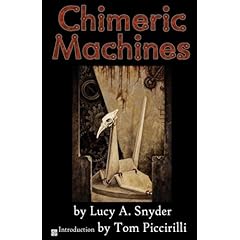
A Stark Interview with Christopher Conlon
KLN: I’ve noticed that you’ve based your poetry collections, Starkweather Dreams, The Weeping Time, Mary Falls: Requiem for Mrs. Surratt, and Gilbert & Garbo in Love: A Romance in Poems on real people. What are your criteria in selecting subjects for your work?
CC: Karen, I’m not so sure that I select them--it often feels more as if they select me! I don’t go out and hunt around for material. What I do is read about things that interest me. If I get interested enough, if I have a strong enough emotional response to what I’m learning, sometimes poems begin to come. For instance, I had no idea I was going to end up writing a book of poems about Charlie Starkweather when I first saw a documentary about him and Caril Ann Fugate on television. But I was fascinated with their story, so I started reading books about them. I began to dream, literally and figuratively, about them. This went on for months. Finally the first poem in the book, “Charlie Dream,” came to me, and I was off and running. It’s been that way with every sequence of poems I’ve written.
KLN: You seem to be very social-minded, what with your service in the Peace Corps in Botswana from 1988 to 1990 and your inclusion in the anthology September 11, 2001: American Writers Respond. Any plans to write a collection based on your beliefs, instead of the historical figures? If not, why not? If so, what cause or belief?
CC: That’s an interesting question. Actually I wrote a lot of poems about my time in Africa, and many of them became my first poetry publications back in the early ’90s. But there were never enough for a book. Anyway, at some point I seemed to lose interest in myself as a subject. That’s most of American poetry, you know--the narrator is invariably a thinly-veiled version of oneself, and we follow that narrator as he thinks about this and that, has this memory or that insight into something. That’s been the dominant mode of poetry since Keats and Shelley in the 19th century. But it wasn’t always. At one point in my life The Iliad meant a great deal to me, Homer’s epic of the Trojan War, and that struck me as closer to something I’d like to do--write about other people’s adventures and joys and tragedies and nightmares. Return to the original storytelling function of poetry. Who cares about the poet, anyway? Why should the poet be so important? I don’t consider myself a particularly interesting person. I think Charlie Starkweather and Caril Ann Fugate are much more interesting than I am. So why not write about them instead?
KLN: With your MA in American literature and teaching experience, you could have easily written a novel or short story about the historical figures you chose. Why did you choose poetry as your medium?
CC: Again, it wasn’t a conscious choice. It just happened. That sounds evasive, but it’s the truth. It’s funny, but despite all these historical poems of mine, I don’t think I could write a historical novel. The thing about the poetry sequences is that they’re very intimate--we’re generally inside the characters’ heads, sharing their subjective experience of reality. So in a sense I get to cheat. I don’t have to do all the scene-setting the historical novelist does. I don’t have to master an enormous amount of historical minutiae. Obviously I need to know something of the period I’m writing about, but my real interest is in who these people were, or who they might have been. What was it like to be Charlie Starkweather? How did he feel when he got up in the morning? How did he think about other people? That’s my focus. For that, it’s not too important that I know how much a quart of milk cost in that period, or a gallon of gas. The historical novelist would need to know those things.
KLN: You edited the well-received anthology Poe’s Lighthouse. In addition to Poe, who are your other favorite horror poets, past and present? What are your current horror editing projects? Any poetry anthologies?
CC: CC: Karen, my latest editing project is He Is Legend: An Anthology Celebrating Richard Matheson, in which a great group of writers--Stephen King, Joe Hill, Whitley Strieber, Joe Lansdale, F. Paul Wilson, many others--riff on classic Mathesonian themes in new, original short stories. It’s out now, from Gauntlet Press. And my next one has just been announced—it’s a poetry anthology called A Sea of Alone: Poems for Alfred Hitchcock, to be published by Dark Scribe Press in 2010. It’s an open-submission anthology which will begin accepting submissions on September 1. Interested poets should check out the highly specific guidelines available at darkscribepress.com. As for horror poets, well, it’s all in the definition, isn’t it? Honestly--this is a kind of pet peeve of mine--I haven’t got a lot of use for much of what gets published as “horror poetry.” It seems to be written by people who haven’t the foggiest notion of what poetry is--people who may have read a bit of Poe or Keats or Edna St. Vincent Millay, but who really have no idea what’s been happening in poetry over the past hundred years. They probably can’t name one major living American poet. They certainly don’t read journals like Poetry or The American Poetry Review. So what they write ends up being neither horrific nor poetic. There are exceptions; one I’ll mention is coming out in the fall from Snuff Books. It’s called Wood Life, by Rich Ristow--a sequence of poems written from the point of view of a serial killer. Ristow has an MFA in Poetry, and it shows--this is a guy who knows what he’s doing. It’s going to knock people’s socks off! But that kind of thing is rare in this field. When I think of real “horror poetry,” I go back to people like Baudelaire and his Flowers of Evil, or Rimbaud. Lovecraft managed a handful of pretty good sonnets, too.
KLN: Thank you for agreeing to this interview. Is there anything additional you’d like to share with our readers?
CC: Only that I hope some of your readers will visit my website, at http://christopherconlon.com, and my blog, at http://chrisconlon.livejournal.com/. I have a lot of fun with the blog, writing about all sorts of things--classic movies, books, and, yes, poetry! And I love to get feedback. Stop on by, if you’ve a mind to.

Starkweather Dreams
by Christopher Conlon;
Creative Guy Publishing, 2009;
77 pages; Paperback $9.95
Charles Starkweather and Caril Ann Fugate come alive in verse in Starkweather Dreams by Christopher Conlon. This outstanding poetry collection delves into the criminal mind of Starkweather and his fourteen-year-old accomplice with bare-bones horror. An example of the sharp, biting verse to illustrate Starkweather’s sharp, biting soul is best found in “Memory: Charlie”
He woke once to wind, to branches
clacking against the window
like the bones of dead men
Conlon uses both alliteration and consonance for the premonition of the staccato effect of a thrusting knife or a penetrating bullet. The visualization here is stunning as if the reader is there, under the covers, in the middle of a nightmare, the nightmare of Charlie. Conlon later uses this to explore Charlie’s sexuality in an effort to make him more than just a monster.
Caril Ann herself is portrayed as a sympathetic victim, a testament to Conlon’s immense talent. He accomplishes this by interweaving both Charlie’s and Caril’ stories and by exploring their dysfunctional relationship with each other and the outside world.
This book is history at its most interesting, especially if one compares today to the late fifties, the time of Starkweather’s serial killing. Today Caril wouldn’t have served that much jail time and perhaps school guidance counselors could have seen how troubled she was. Unfortunately, Charles Starkweather fits in, or sadly, isn’t as frightening as some serial killers now, yet Conlon still elicits real fear from the collection.
But what separates Starkweather Dreams from just another retelling is that some poems are from the victims’ points of view, thus adding to the overall terror, the best example being the poem “Countdown”
Or that in thirty-eight minutes
he’ll place the shotgun behind her head
and burst her brain like crushing an egg
This collection is dark historical poetry at its finest.
--Karen L. Newman

Chimeric Machines
By Lucy A. Snyder
Creative Guy Publishing
Trade/$10.95
Back in 2007, I did review of Lucy Snyder’s short story collection, “Sparks and Shadows” (HW Press, 2007), and was blown away by her ability to cut and kiss with the same sentence. It was an astounding collection that rightfully garnered accolades from many genre reviewers and professional organizations. Now Lucy Snyder has released what may be the best collection of poetry I’ve read in years- within or without the genre.
Divided into seven carefully balanced parts, Snyder opens the collection with the perfect selection to warn the reader of CHIMERIC MACHINES’ impending agenda with ‘Modernism’, a poem steeped in brutally beautiful symbolism that does not leave any doubts of what’s to come.
There is not one poem in CHIMERIC MACHINES that doesn’t fit in place like a delicately carved piece of a complex and consuming puzzle. There are poems of ethereal beauty that waft through your senses like sugary winged butterflies, and poems that feel like cold rusty blades being driven violently into your soul. One in particular left me teary eyed. ‘Babel’s Children’ is less an ode and more of a denouncement of how the late great J.N. Williamson was let go into the void by his ‘loved’ ones.
If it’s only half true…well, I’ll let you read and decide their deserved fates.
Snyder gives us passion, love, desire, hate, despair, sometimes in the same stanza. It is a gifted wordsmith that can alternately touch your heart and make you existentially nauseous.
But Snyder has a playful side, too, as displayed in Part 4, ‘Crete, Kentucky’, where gathers together a motley crew of grifters and killers and tells their stories in poetic form-- a sort of mini Spoon River Anthology for the horror geeks among us.
If there was ever any doubt about this author’s talent, CHIMERIC MACHINES will put them to bed for good and all. There is no other writer working today quite like Lucy A. Snyder. And watching her develop is going to be a once in a lifetime marvel to behold.
P.S.--Get a copy of CHIMERIC MACHINES before she becomes the next big thing. Del Rey, a large NYC publishing house, has finally recognized her enormous talent, and her impeding release with them, SPELLBENT, promises to push her into the well-deserved spotlight.
Lucy A. Snyder’s LiveJournal
--Nickolas Cook
